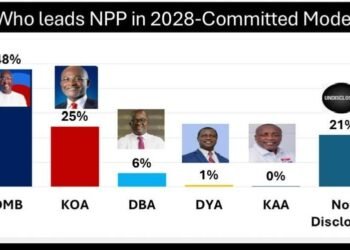Prof. Kwaku Azar Asare, a governance fellow at CDD Ghana, has reiterated the importance of restricting last-minute presidential appointments, which are often undeserved.
He has proposed that the Presidential Transition Act be amended to address this issue more effectively.
According to Azar Asare, “midnight appointments”—often made in the final hours of a government’s tenure—often lack proper oversight and transparency, leading to potential misuse of power and resources.
He advocates for reforms that would ensure greater accountability and better management of public positions, particularly during the transition period between administrations.
By amending the Act, he believes that the process of appointing officials will be more regulated, reducing the risk of rushed or politically motivated appointments.
“Prohibition of Last-Minute Appointments: The outgoing President, Vice President, Ministers, and other appointees of the Executive shall not make or approve any appointments to public office during the period, beginning three months before the end of their term of office”.
Prof. Kwaku Azar Asare
Prof. Asare further explained that his proposal applies immediately after the declaration of presidential election results, with the intention of preventing the outgoing president from making unnecessary appointments during the transition period.
He argued that such last-minute appointments, frequently made during the twilight of an outgoing administration, can create significant challenges for good governance.
These actions, he noted, often bypass due process, resulting in a lack of transparency and accountability.
Prof. Asare highlighted that these hurried decisions can undermine public trust, as they may appear to prioritize personal or political interests over national welfare.
Additionally, he cautioned that such appointments could burden the incoming administration with individuals whose selection might not align with its priorities or vision for governance.
According to Prof. Asare, under this proposed framework, exceptions could be made for appointments deemed critical to the continuity of government functions.
He noted that, however, these appointments would be subject to review by the incoming administration within 90 days of assuming office.
The governance expert maintained that this provision would allow the new government to assess and, if necessary, make adjustments to ensure that the appointments align with its priorities and objectives.
Changes to Transition Act to Prevent Abuse of Power
Furthermore, Prof. Kwaku Azar emphasized that the Presidential Transition Act must be amended to grant the incoming President the authority to confirm, modify, or revoke any essential appointments made during the transitional period.
He explained that this process should be conducted in consultation with the Council of State to ensure transparency, fairness, and alignment with national interests.
This amendment, he noted, would prevent abuse of power during transitions and ensure that last-minute appointments are scrutinized for their necessity and merit.

By providing the incoming President with this oversight, the amendment would reinforce accountability while fostering smoother transitions between administrations.
Prof. Asare further proposed that the amended Presidential Transition Act should include stringent penalties for individuals who deliberately circumvent the established restrictions.
“Any official found to have contravened this amendment shall be subject to penalties [such as] nullification of appointments made in violation of this Act”.
Prof. Kwaku Azar Asare
He also suggested imposing a fine equivalent to 10,000 penalty units or a prison sentence of up to six months for offenders.
This measure, he argued, would serve as a strong deterrent against willful violations of the regulations governing appointments during the transitional period.
By introducing such penalties, the Act would reinforce its authority, ensuring strict adherence to its provisions and discouraging actions that undermine the integrity of the governance process.
Prof. Asare emphasized that midnight appointments are often controversial, citing a historical example to illustrate his point.
He referenced the renowned U.S. case Marbury v. Madison, which arose from a last-minute appointment and became a landmark legal precedent.
This case, he stressed, underscores the complications and disputes that can arise from hurried decisions made during the final moments of an outgoing administration.
READ ALSO: Israel Rejects ICC Arrest Warrants Issued For Netanyahu, Gallant























